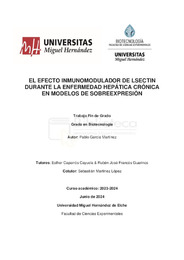Resumen :
La cirrosis es una enfermedad que puede ser desencadenada por diversos factores como abuso de alcohol, infecciones virales, NAFLD u obesidad y se considera la última etapa de la enfermedad hepática. Al principio, se produce una lesión hepática que causa un daño en los hepatocitos, los cuales acaban sufriendo muerte celular en el caso de que el daño sea persistente. La muerte celular provoca una liberación de señales proinflamatorias que llevan a cabo la activación de las células del sistema inmune presentes en el parénquima hepático. Estas, a su vez, activan otras células responsables de la regeneración del tejido hepático como son las HSCs. Sin embargo, durante la cirrosis, el mecanismo de regeneración del tejido sufre una desregulación debido al aumento de la magnitud en la respuesta inflamatoria, causando así un estado de producción excesiva de matriz extracelular por parte de las HSCs conocido como fibrosis. LSECtin es una lectina de tipo C que se encuentra en el endotelio hepático y relacionada con la regulación de la inflamación, lo que supone una diana interesante tanto para el diagnóstico como para el tratamiento de la enfermedad hepática crónica. De hecho, su expresión en hígados cirróticos humanos y de ratones se encuentra disminuida relacionándose esto con un aumento de la inflamación. Además, se sugiere su posible actuación como represora de determinadas subpoblaciones de linfocitos que promueven la inflamación en el hígado. En este trabajo se ha evaluado el papel inmunomodulador de LSECtin, mediante el uso de modelos murinos de cirrosis por tetracloruro de carbono (CCl4) oral. Concretamente, se ha evaluado el daño hepático de ratones wild type y de ratones con sobreexpresión de LSECtin. Concluimos que LSECtin presenta un papel clave en el desarrollo de la cirrosis modulando las poblaciones linfocitarias proinflamatorias, pudiendo ser esta una diana terapéutica para el tratamiento de la cirrosis.
Cirrhosis is a disease that can be triggered by various factors such as alcohol abuse, viral infections, NAFLD, or obesity and it is considered the final stage of liver disease. After a liver injury, cell death is induced on damaged triggering the release of pro-inflammatory signals that activate the immune cells present in the liver parenchyma. These, in turn, activate other cells responsible for liver tissue regeneration, such as HSCs. However, during cirrhosis, the tissue regeneration mechanism becomes dysregulated due to the increased magnitude of the inflammatory response, leading to a state of excessive extracellular matrix production by HSCs known as fibrosis. LSECtin is a C-type lectin found in liver endothelium and has been involved in inflammation regulation. As its expression is reduced in cirrhotic human and mouse livers it stands out as an interesting target for both the diagnosis and treatment of chronic liver disease. Additionally, it has been suggested that it may act as a repressor of certain lymphocyte subpopulations that promote liver inflammation. In this study, we evaluated the immunomodulatory role of LSECtin using a mouse model of cirrhosis by carbon tetrachloride (CCl4) oral administration. Specifically, damage has been evaluated in wild type mice and mice that overexpress LSECtin. We conclude that LSECtin plays a key role in the development of cirrhosis modulating proinflammatory lymphocyte populations, suggesting its potential as a therapeutic target in cirrhosis.
|
 La licencia se describe como: Atribución-NonComercial-NoDerivada 4.0 Internacional.
La licencia se describe como: Atribución-NonComercial-NoDerivada 4.0 Internacional.
.png)
